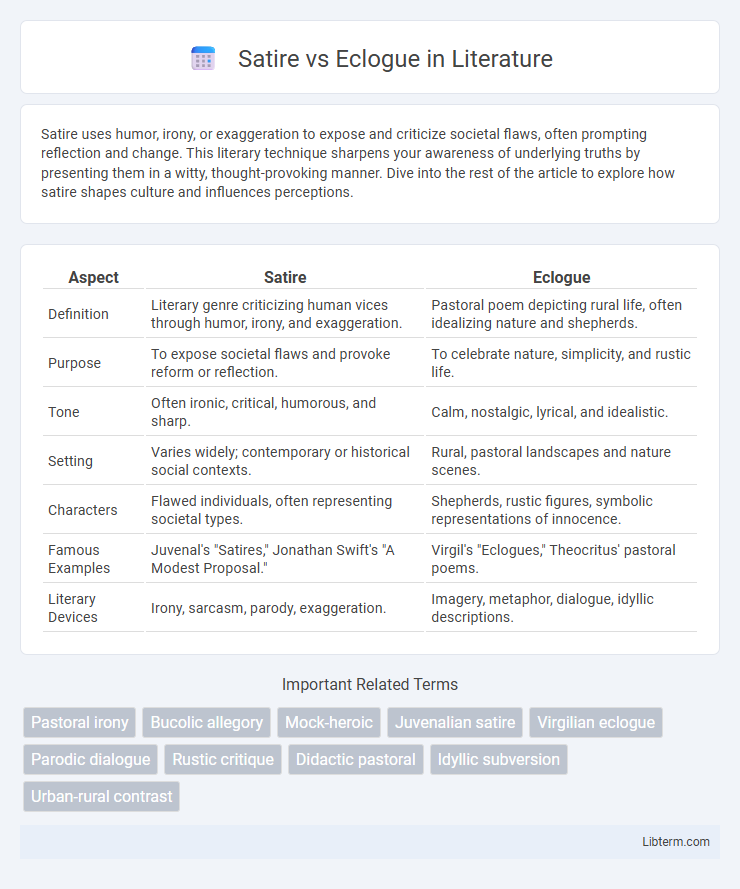Satire uses humor, irony, or exaggeration to expose and criticize societal flaws, often prompting reflection and change. This literary technique sharpens your awareness of underlying truths by presenting them in a witty, thought-provoking manner. Dive into the rest of the article to explore how satire shapes culture and influences perceptions.
Table of Comparison
| Aspect | Satire | Eclogue |
|---|---|---|
| Definition | Literary genre criticizing human vices through humor, irony, and exaggeration. | Pastoral poem depicting rural life, often idealizing nature and shepherds. |
| Purpose | To expose societal flaws and provoke reform or reflection. | To celebrate nature, simplicity, and rustic life. |
| Tone | Often ironic, critical, humorous, and sharp. | Calm, nostalgic, lyrical, and idealistic. |
| Setting | Varies widely; contemporary or historical social contexts. | Rural, pastoral landscapes and nature scenes. |
| Characters | Flawed individuals, often representing societal types. | Shepherds, rustic figures, symbolic representations of innocence. |
| Famous Examples | Juvenal's "Satires," Jonathan Swift's "A Modest Proposal." | Virgil's "Eclogues," Theocritus' pastoral poems. |
| Literary Devices | Irony, sarcasm, parody, exaggeration. | Imagery, metaphor, dialogue, idyllic descriptions. |
Understanding Satire: Definition and Purpose
Satire is a literary genre that uses humor, irony, exaggeration, or ridicule to expose and criticize human vices or social flaws, often with the intent of prompting improvement. Its purpose is to provoke thought and encourage reform by highlighting the absurdities and injustices prevalent in society. Unlike the pastoral and idealized themes of an eclogue, satire directly confronts everyday realities with a critical and often moralistic tone.
What is an Eclogue? Origins and Features
An eclogue is a poetic form rooted in ancient pastoral literature, originating from the Latin word "ecloga," meaning "selection" or "excerpt," primarily attributed to Roman poet Virgil in his "Eclogues." Characterized by its bucolic and idealized portrayal of rural life, the eclogue typically features dialogues between shepherds or rustic characters, reflecting themes of nature, love, and rustic simplicity. This genre emphasizes lyrical beauty, pastoral imagery, and often serves as a vehicle for political or social commentary through allegory, distinguishing it from the satirical tone and broader social critique found in satire.
Historical Development of Satire in Literature
Satire has roots in ancient Roman literature, evolving significantly from the works of writers like Horace and Juvenal, who used humor and irony to critique society and politics. This literary form contrasted with the eclogue, a pastoral poem focusing on rural life and nature, popularized by Theocritus and later Virgil. The historical development of satire reflects its adaptability to cultural and political contexts, shaping its role as a tool for social commentary across centuries.
The Evolution of Eclogue in Poetry
Eclogue evolved from ancient pastoral poetry, emphasizing idealized rural life and dialogues between shepherds that symbolize broader social or political themes. Unlike satire, which critiques society through humor and irony, eclogues maintain a soothing tone while exploring human emotions and natural landscapes. Over time, poets integrated personal reflection and philosophical ideas into eclogues, expanding their thematic range beyond traditional pastoral settings.
Key Differences Between Satire and Eclogue
Satire and eclogue differ fundamentally in purpose and style; satire employs humor, irony, and exaggeration to criticize social vices and human follies, while eclogue presents pastoral poetry often centered on rural life and idealized nature. Satire's tone is typically sharp and corrective, aiming to provoke change or reflection, whereas eclogue conveys a peaceful, nostalgic mood emphasizing harmony and simplicity. The narrative structure of satire is often episodic and varied, contrasting with the eclogue's dialogue-driven format between shepherds or rustic characters.
Prominent Examples of Satirical Works
Satire as a literary genre employs humor, irony, and exaggeration to critique societal flaws, with prominent examples including Jonathan Swift's "Gulliver's Travels" and George Orwell's "Animal Farm," both renowned for their sharp social commentary. In contrast, eclogues are pastoral poems idealizing rural life, exemplified by Virgil's "Eclogues," which focus on nature and shepherds rather than societal critique. The enduring impact of satirical works lies in their ability to provoke thought and reform through wit, distinguishing them from the more serene and idyllic themes prevalent in eclogues.
Famous Eclogue Poems and Poets
Eclogues, characterized by pastoral themes and dialogues between shepherds, prominently feature in the works of poets like Virgil, whose "Eclogues" set a standard for the genre in Latin literature. Famous eclogue poems emphasize idyllic rural life, contrasting sharply with the critical and often humorous tone of satire. Notable eclogue poets include Theocritus, considered the originator of the pastoral form, and Edmund Spenser, who adapted the style in his "The Shepheardes Calender.
Thematic Contrasts: Satire vs Eclogue
Satire explores societal flaws through sharp irony, criticism, and humor, focusing on themes of vice, corruption, and human folly, while eclogue centers on pastoral life, nature, and idyllic rural settings, celebrating simplicity and harmony. Satire often employs urban or political contexts to expose moral shortcomings, contrasting with the eclogue's emphasis on shepherds, rustic landscapes, and romanticized countryside. The thematic contrast highlights satire's engagement with social realism and critique versus the eclogue's idealization of nature and nostalgia.
Literary Techniques: Satirical vs Pastoral Approaches
Satire employs irony, sarcasm, and exaggeration to critique societal flaws and provoke reflection, while eclogues use idyllic imagery, symbolism, and pastoral dialogue to idealize rural life and human-nature harmony. Satirical techniques often involve direct confrontation and parody to expose hypocrisy, whereas eclogues focus on gentle, poetic narratives that evoke tranquility and simplicity. The contrast highlights satire's aggressive tone against the eclogue's serene, idealized settings, showcasing different literary strategies for social commentary and artistic expression.
Modern Interpretations: Satire and Eclogue Today
Modern interpretations of satire emphasize its role in critiquing contemporary social and political issues through irony and humor, often blending traditional forms with digital media platforms. Eclogues today are reimagined as poetic dialogues that explore pastoral themes while addressing modern ecological concerns and urban experiences. Both genres continue to evolve, reflecting current cultural contexts and expanding their relevance beyond classical origins.
Satire Infographic

 libterm.com
libterm.com